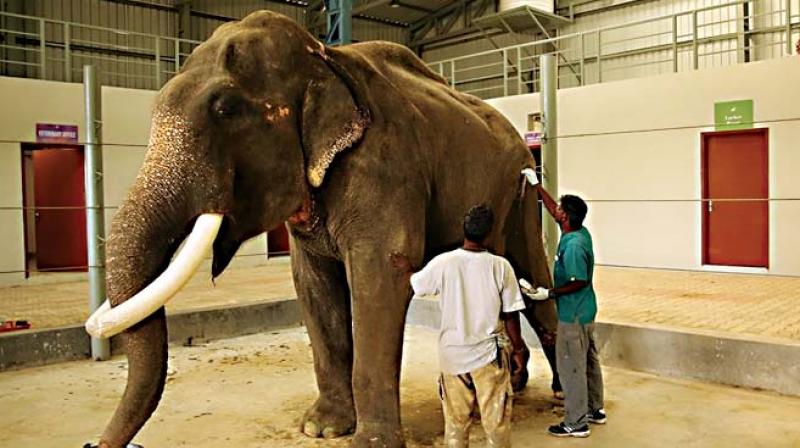Bengaluru: Shackled and chained, they suffer in silence
Elephant owners posses ownership certificate issued by Chief wildlife warden of the state with respect to each animal in his custody.

Bengaluru: Over 150 Asiatic elephants are in captivity across the state and their ill-treatment goes to an extent of being used for begging and lifetime confinement in temples and mathas.
After the establishment of Elephant Conservation and Care Centre (ECCC) by a NGO, Wildlife SOS in collaboration with Uttar Pradesh Forest Department, similar demands have been raised by former Principal Chief Conservator of Forests (PCCF) of Karnataka B.K. Singh.
More than 40 elephants are made to walk from Kerala to Karnataka to haul timber.“Nowadays the extraction of trees even in private areas have come down and elephants have become jobless. When I was Chief Wildlife Warden of the state, an elephant was tied to a tree and was abandoned by the owner in Mudigere in Chikkamagaluru district. It remained hungry for few days till we knew about it,” Singh said.
He said that there have been several incidences of elephants killing its mahaout for ill-treatment. “Elephants in urban areas are made to walk on tarred roads and cemented grounds. Owners do not bother to organize daily walk for the animal nor do they allow it to access water bodies. Under stressful conditions, such animals develop several diseases. As breeding is continued even in private captivity, we need to focus on its welfare,” Singh pointed out. There are as many as 24 elephant camps run by respective Forest Departments across the country. Besides, there are many elephants which are privately owned, some of whom had cruel history of being used for begging and some spent lifetime in captivity and confinement of temples, while the remaining were being forced to perform in circuses.
It is generally observed that the bodies of captive elephants are weakened due to improper nutrition, their delicate feet are riddled with wounds, and they are socially isolated and psychologically depressed.
Elephant owners posses ownership certificate issued by Chief wildlife warden of the state with respect to each animal in his custody. These elephants do change hands; one owner gifts it to other as the sale is prohibited under Wildlife (Protection) Act 1980.
“However, no gift is made without recovering the cost and the transaction is not brought on record. Maintenance of elephant is costly affair and no owner would like to spend the amount without earning some revenue,” he pointed out.
Singh deliberated that law is required to be strengthened so that Chief Wildlife Warden or any authorized officer can seize an animal subjected to ill-treatment and also proceed against the owner.
“Sometimes officers do not take action as there is no rescue centre with proper veterinary facilities. If Governments cannot afford to establish such facilities, it is required to be established in partnership of NGOs on the lines of ECCC and recently established hospital by Wildlife SOS in Mathura. With dedicated treatments, we will be able to identify and develop a model for management of Asian elephants in captivity across the world,” Singh said.

